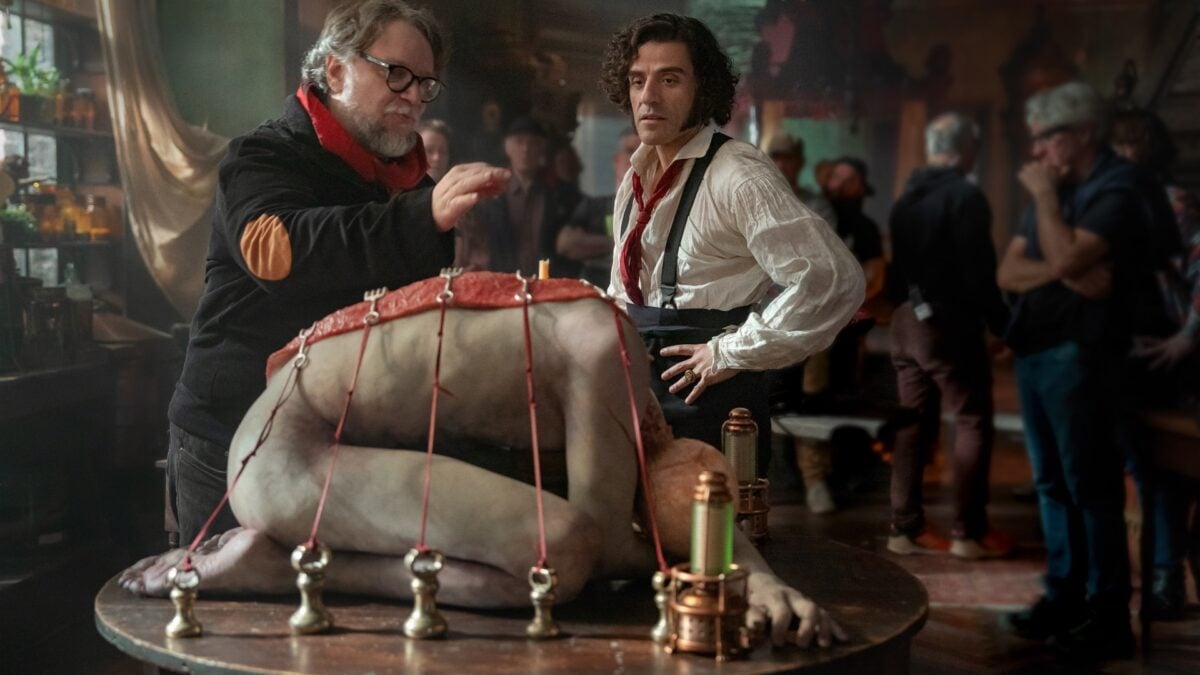
In a conversation with Guillermo del Toro and Oscar Isaac, published online by GQ To promote the long-awaited collaboration between cinema favorites, the duo spoke about how their Latin culture influenced their vision of cinema. Frankenstein.
Guillermo del Toro revealed that he and Isaac were on the same page from day one: “I think one of the things we connected during that dinner was our Latinidad. Because obviously the shadow of the father is seen differently in the Latin family, I think.”
Isaac added: “[The] The patriarchal thing is so strong.”
The director nodded at his actor’s assessment of how patriarchy comes into play in his film in a different tone due to his upbringing: “[And] the melodrama and the drama of being blind to those defects, you know, it’s very Mexican.” The filmmaker shared that he showed Isaac’s film 1949. The Black Sheep (The Black Sheep) by Mexican filmmaker Ismael Rodríguez, starring Pedro Infante, the emblematic figure of macho masculinity of a bygone cinematic era; think Clark Gable in Spanish.
Isaac shared how he sprinkled in some of the star’s screen presence by drawing his Victor’s masculine energy into the Infante’s sweeping movements when performing key scenes: “We used that moment where Jacob [Elordi] comes back to ask for a bride,” and described how the creator responded to his creature’s request, “and I just walked by him and pushed him. “That was a little nod.”
From a cinematographic point of view, Del Toro explained his intention: “Those moments for me are things that are determined only by a Latin culture. The brown Catholicism of the film. But I think the kind of pageantry of Catholicism, which borders on the operatic, you know, the intensity of the emotions.”
Isaac agreed: “That’s why we talked about it being an outsider’s story. I told you a lot about that first meeting, which was like feeling like an outsider from the moment I met you.” [I] “I came from Guatemala to this country and I move constantly and I always feel a little different.”
Isaac explained that this was something he experienced while trying to prove himself throughout his career to play roles outside of Latin stereotypes as his career evolved. “That kind of fueled this kind of myopic view of excellence. The only way I can be successful is by being excellent and better than everyone else at this. And no matter what it takes, that was something that definitely, I think, fueled Victor.”
For del Toro, this made Isaac the right choice for his leading man in his lifelong dream project: “The Victor who I really think would be a fresh Victor is a Victor who had swagger, sensuality and style.” The filmmaker came to that conclusion from his experiences as a Latino, which ended up reflecting how he would view Victor’s final form in the final film when it came to fruition as “claiming that not for a British actor, not for an Anglo actor,” as it related to his connection to Mary Shelley. frankenstein. “We talked on set and I said, ‘It’s not an accident that our Victor is played by, you know, Oscar Isaac Hernández.’ And we got some of that energy back.”
Isaac added how he took advantage of that wavelength. “Yes, exactly. At one point, you think, ‘A European would never make a movie like this,’ because of the way you shot it with these huge sets and also the way you direct; sometimes you say, ‘I need María Cristina,'” he said, referring to the classic soap opera move in which an actor steps away to process an emotion before performing a dramatic physical reaction, whether it’s a full-body spin or wide-eyed eyebrows and gaze skyward.
In frankenstein It is intentionally used with great Gothic aplomb. Isaac shared the note that Del Toro gave him in a great moment with Mia Goth. “’It was like you had to go over his left shoulder and then stop and turn around,’” he recalled.
“It’s like a soap opera,” Del Toro interjected.
Isaac recalled: “You have to make this Mexican boy very happy,” he said, referring to the boy who grew up worshiping Frankenstein, who at an older age would approach him to interpret the complex antihero of Shelley’s text.
Del Toro stated: “When people say, ‘What’s so Mexican about your movies?’ I say: ‘I’. Yes,” he laughed, celebrating how his culture permeates his creations. “What more do you want? I think you can’t deny what you are, who you are. And what moves you in any act of artistic expression, you know?”
Watch the rest of the interview below:
Correction: An earlier version of this article cited Netflix as a source. In fact, it was originally shared by GQ.
frankenstein is now in theaters and will be released on netflix November 7.
Want more io9 news? See when to expect the latest releases from Marvel, Star Wars and Star Trek, what’s next for the DC Universe in film and television, and everything you need to know about the future of Doctor Who.
#Guillermo #del #Toro #Oscar #Isaac #Frankenstein #speak #Latin #American #culture










